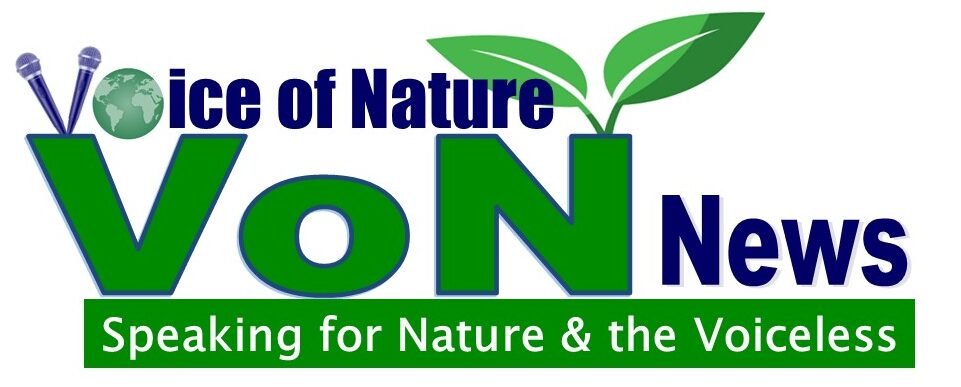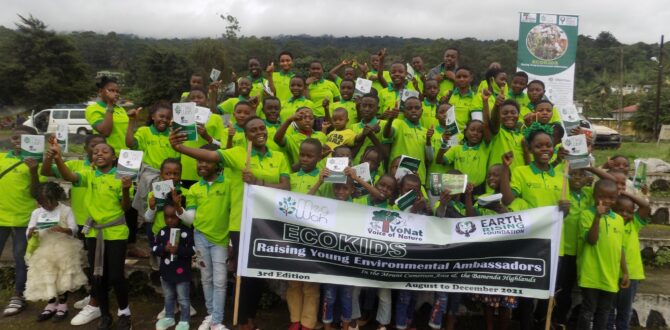Kids and youths are those who will have to deal with the effects of climate change in the future as well as cut down on greenhouse gas emission. Yet this category of people seem to have been ignored and are increasingly worried and helpless seeing the ugly face of climate change with relatively limited understanding of what is happening and what to do. Cameroon-based environmental non-profit organizations, Voice of Nature (VoNat) and Meg Wah (My Earth) have set out to change this narrative.
With the support of a US-based non-profit Organization, Earth Rising Foundation, these community-based non-profits have used folktales & storytelling, climate education, media & arts, experiential sessions on climate information gathering, nursing and tree planting to put over 120 community kids and youths in the North West and South West regions of Cameroon on the frontline of climate actions.

The kids and youths from Mankon and Nkwen in Bamenda, and Bakweri Town and Bonakanda in Buea are raising awareness in their communities, nursing and or planting fruit trees, and ridding rivers of plastics in support of sustainability and climate justice. They are already leveraging on the lessons learnt during the 3 to 4 months climate actions advocacy experiential learning sessions to make a difference for the climate in their communities.
As the first victims of climate change, and understanding the extreme consequences this crisis will have on them decades to come, VoNat and Meg Wah are building the skills of these kids and are causing them to demonstrate leadership in tackling climate change issue, not in the future but now.
Use of of Folktales to Kids for Climate Actions
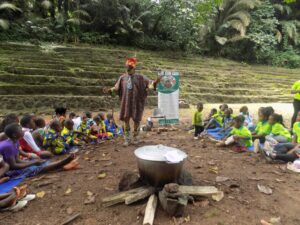

Children engaged in the fight against climate change via folktales Folktales about plants and animals are mechanisms that greatly contributed in species conservation in Africa during the pre-colonial era. Meg Wah and VoNat mimicked this age-old pro-conservation practice in the Ecokids project.
In a typical traditional setting at the Limbe Botanical Garden-South West Cameroon dubbed the jungle village, the kids, dressed in different traditional regalia, sat around the three-stone fire site eating freshly boiled groundnuts, corn and plump while listening to age-old tales about biodiversity species and the changes in the climatic conditions from old folks. The youngsters listened to “Boutobora”, a special messenger sent from the gods of Mount Cameroon narrate stories about the importance of trees and animals.
Fai Ella Pauline from Buea, like many youngsters at the Ecokids Programme said she was happy being reconnected to nature and understanding the underlying importance of trees and animals in fighting against climate from the folktales.
Climate Education
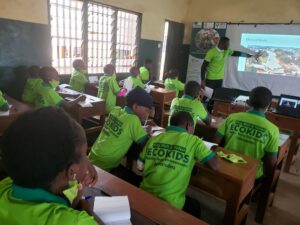
Climate education remains a key tool in reversing climate change and its impact both now and in the future. In the Ecokids program charts, power point presentations, storytelling, photos, and videos were used to instill in the youngsters the appetite to act against climate change. The youngsters in Bamenda and Buea gained understanding on the causes, impacts and future risks of climate change, and how they can tackle and or adapt to this global crisis and the challenges it is posing in their communities. “The program has inspired me and other kids to think about the climate and the role we can play; to think about nature in our actions,” Che Bianka Victory said after seating through different climate education sessions.
Climate Change information Gathering


Seeing, they say, is believing. Kids in Bamenda moved round their communities and got proper picture on the role of trees in fighting climate change. They watched how vehicles emits gases that contributes to climate change. The kids also moved round their communities, identified, and took images of the impact of climate change while interviewing locals on how climate change is affecting them. This stimulated in the youngsters the desire to be part of the solutions to climate change. “The water volume is very low because of the cutting down of trees. I will nurse and plant trees in our compound and sensitize my friends and neighbors to do same. I will also sensitize my community not to dump plastics and refuse in the river.” Helga wafa said.
Tree Planting
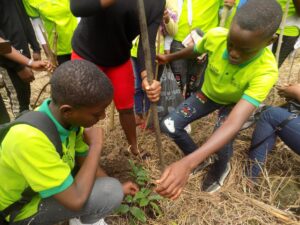

Trees play a crucial role in removing air pollutants, absorbing Carbon dioxide that induces climate change, reducing rising temperatures amongst others. With this understanding, the kids were drilled on seed selection, nursery management, transplanting and maintenance. In Buea, the kids established an orchard of indigenous trees, while those in Bamenda planted trees in public spaces. “We are very grateful to you for choosing our environment to carry out such a laudable activity. These children will grow knowing the various procedures involved in planting a tree and the importance of trees in our environment,” Camille Paul, a Bamenda-based religious leader said.
Media & Arts for Environment
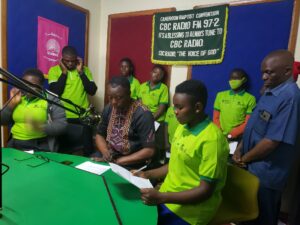

The youngsters translated the lessons learned into dramas, articles, stories, debates, songs, drawings, and paintings with great environmental lessons and a call to shun actions that contributes to climate change. These were presented to their parents, friends, and key environmental stakeholders. They were also broadcast on CBC Radio, STV, Legacy TV and others for a community-wide sensitization against climate change and environmental pollution.
Recognition of Kids for Climate Actions

Kids who distinguished themselves in taking different climate actions during the Ecokids program in Bamenda and Buea, were offered prizes. This was in a closing ceremony where the children also exhibited some of the activities carried out to the admiration of their parents and other environmental actors.
Government Pledge Collaboration
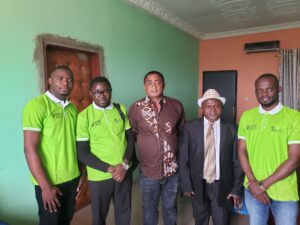
Officials of the North and South West Regional Delegation of Environment, Protect of Nature and Sustainable Development (MINEPDED) and the Bamenda Council lauded the children-centered approach taken by VoNat and Meg Wah to tackle the climate change crisis. They promised to accompany both organizations in their strive to solve the different environmental challenges in Cameroon using kids and youths “who are the leaders of tomorrow”.
By Ndimuh B. Shancho
